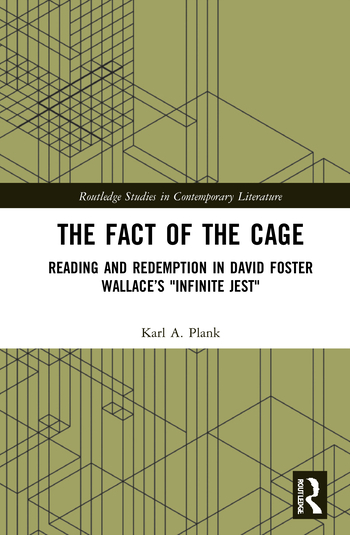SELECTED ACADEMIC WRITINGS ON POETRY, CRITICISM, AND RELIGION AND LITERATURE

THE FACT OF THE CAGE: READING AND REDEMPTION IN DAVID FOSTER WALLACE’S INFINITE JEST (New York and London: Routledge, 2021). See here for ordering information: https://www.routledge.com/The-Fact-of-the-Cage-Reading-and-Redemption-In-David-Foster-Wallaces/Plank/p/book/9780367611347
“This is a book that celebrates and educates us in the art of good reading of good texts. It is a joy to read and its scholarship is superlative.” David Jasper, Professor of Literature and Theology, University of Glasgow.
“In The Fact of the Cage, Karl A. Plank interprets Wallace as he wanted to be interpreted: with critical passion and with a very keen eye for ethical concerns. This eloquent book offers sharp close-readings, new philosophical contexts, and well-grounded answers to whether and how time spent with Infinite Jest can help make us better people.” Jeffrey Severs, Associate Professor, University of British Columbia, and author of David Foster Wallace’s Balancing Books: Fictions of Value.
“Can reading well help make you a better person? Numerous writers and critics have intimated that it can–perhaps none with more passion and more sorrow than David Foster Wallace. In The Fact of the Cage, Karl Plank explores with both curiosity and care the possibilities that wrestling with Wallace’s own writing might open up. The result is a powerful volume that is attentive both to the literary condition and to the human condition, both to the opportunities for ethical reflection that the novel may be uniquely able to facilitate as well as to the difficult work asked of the reader who seeks in reading a form of redemption.” Kathleen Fitzpatrick, Director of Digital Humanities and Professor of English, Michigan State University.

Mother of the Wire Fence: Inside and Outside the Holocaust (Louisville: Westminster John Knox, 1994). A study of holocaust hermeneutics treating among other works, poetry of Dan Pagis, Simcha Bunem Shayevitsch, Y. Katzenelson, and Michael Martin.
Articles
“Decentering the Holocaust: What Bezmozgis and Englander Are Talking About,” Religion & Literature 48/2 (2016): 133-53.
“Why Dead Men Don’t Praise God: A Post-Holocaust Reckoning in the Poetry of Glatshteyn and Osherow,” Religion & Literature 42/3 (Autumn 2010): 75-91. Also here: why dead men don’t praise god.
“By the Waters of a Death Camp: An Intertextual Reading of Psalm 137,” Journal of Literature and Theology 22 (June 2008): 180-194. Also here: By The Waters Of A Death Camp.
“Ascent to Darker Hills: Psalm 121 and its Poetic Revision,” in Journal of Literature and Theology 11/2 (1997): 152-167. Also here: Ascent to Darker Hills.
“Scripture in a Sealed Railway-Car: A Poem of Dan Pagis,” in Journal of Literature and Theology 7/4 (1993): 354-364. Also here: Scripture In A Sealed Railway-Car.
“Unbroken Trains: Reflections on Michael Martin’s Approaching History,” in Shenandoah 43/2 (1993): 87-100.
“Thomas Merton and Hannah Arendt: Contemplation after Eichmann,” in The Merton Annual 3 (1990): 121-150. Also here: Thomas Merton and Hannah Arendt.
Reviews
“With Faces Drifting Off to the War,” a review of Lee Sharkey, Walking Backwards (Tupelo Press, 2016), in Consequence (March 2017). Here: Consequence